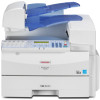Ricoh FAX3320L Facsimile Reference [Basic Features] - Page 65
Registering groups in Quick Dial keys, Assigning the Group Functions to the, Group key
 |
UPC - 026649305269
View all Ricoh FAX3320L manuals
Add to My Manuals
Save this manual to your list of manuals |
Page 65 highlights
Groups Groups If you regularly broadcast documents to the same set of destinations, you can combine these numbers into a group. Then just select the group and each number will be dialed in sequence automatically. There are two ways of programming Groups: ❖ Registering groups in Quick Dial keys If you register a group in a Quick Dial key, you can specify that group by pressing a Quick Dial key. However, if you use Quick Dial keys to register groups, you will be able to register fewer Quick Dial keys . Note ❒ You cannot register another function (Quick Dials) in a Quick Dial key already used for a group. Also, you cannot register groups in a Quick Dial key already used for another function. ❖ Assigning the Group Functions to the Group key To assign the Group Function to the Group key, you must first assign the Group function to a User Function key. To send a fax, press the Group key, and then enter the group number (1 to 5). To select a Group using a Group key, one more step is required than when using a Quick Dial key. However, multiple Groups (a maximum of five) can be stored in a Group key, thus leaving the Quick Dial keys to be used more effectively. Registering You can register the following items in a Group: • Destination fax numbers • Group name (up to 20 characters) You can enter destination numbers 3 using Quick Dial keys, Speed Dials, or the number keys. Note ❒ You can register up to 5 Groups. ❒ The maximum number of destinations you can register in a Group is 140. ❒ The combined maximum number of destinations you can register in all Groups is 149. This 149 can be composed of up to 30 Quick Dial numbers, 50 Speed Dial numbers and 69 numbers entered directly with the number keys. ❒ The number of destinations that can be registered with the number keys depends on how the machine is used. In theory you can register up to a combined maximum of 69 destinations with the number keys for all groups. ❒ If you register 69 destinations with the number keys, Memory Transmission using the number keys becomes unavailable, and only Immediate Transmission is available. ❒ If you register a Group with the number keys when a file is waiting to be transmitted, a message is shown. You sometimes cannot register any more destinations even when the number of specified destination is 68 or less. 59















